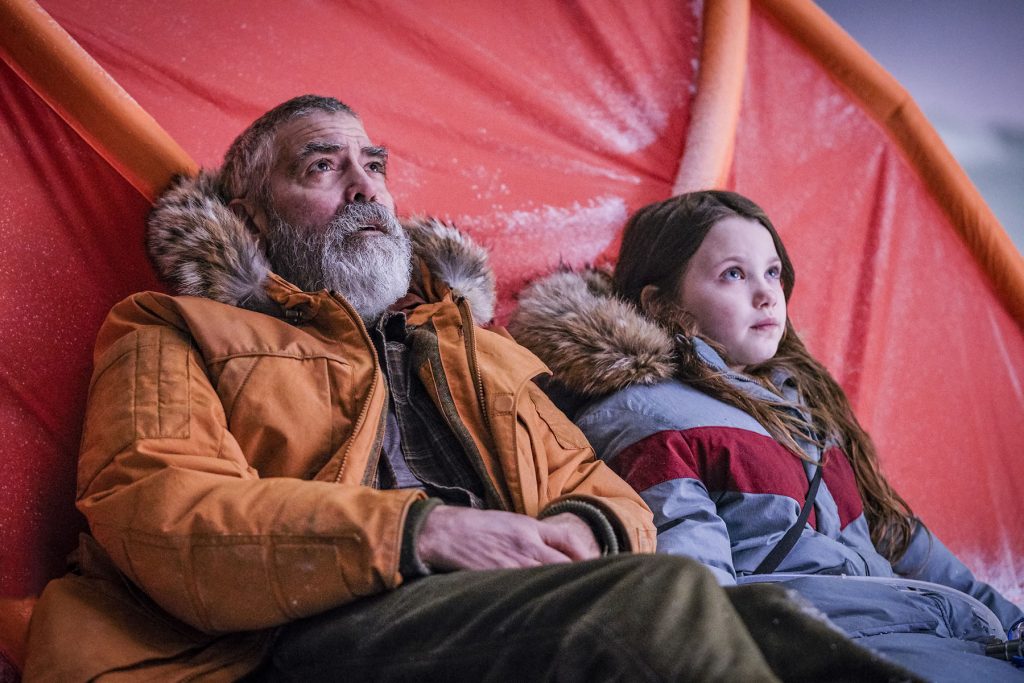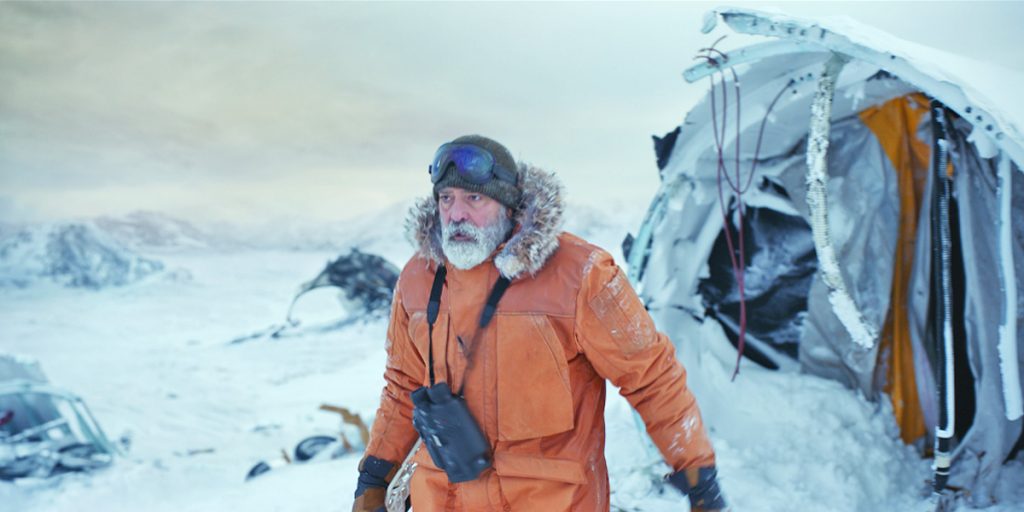Netflix’s film The Midnight Sky is a textured, smart, and slow epic that emphasizes character, and melancholy, over action.
As I sit down to write about The Midnight Sky, I cannot help but feel defensive: it feels like the sort of film that’s going to take a beating from the general public. The movie received Netflix’s annual Christmas release slot, which traditionally has been used on big populist movies like Bright, Bird Box, Avengers: Infinity War, and 6 Underground. This is not that sort of film; in fact, the action beats feel almost like half-hearted inclusions to justify the film’s budget. I think a lot of serious cineaste sorts are going to be displeased as well – their kind does not well receive the sort of compassionate melodrama on display here.
At its heart, director George Clooney’s The Midnight Sky is a deeply compassionate and poetic rumination on connection and the meaning of life. The film tells two parallel stories: in one a scientist (Clooney) remains alone at a north pole adjacent science station as the rest of the planet succumbs to some undescribed, but apparently, nuclear planet killing event, and in the other, a team of astronauts attempts to navigate back to Earth after losing contact with the planet. The scientist, portentously named Augustine Lofthouse, elects to spend his last days traversing the arctic with a stowaway young girl to make last contact with the astronauts returning home from a mission to a habitable moon of Jupiter.
The astronauts are played by a rogue’s gallery of splendid character actors who ably imbue their characters with humanity and texture despite modest screen time. David Oyelowo (Selma), Demian Bichir (A Better Life), Felicity Jones (Rogue One: A Star Wars Story), Tiffany Boone (The Chi), and Kyle Chandler (Friday Night Lights). Chandler in particular stands out. Always an actor of gravelly realism, here Chandler plays the astronaut in the crew most interested in getting home. Not the usual cliché of a panicked astronaut acting in self-interest, he simply loves and misses his wife and kids. Each astronaut has a 3D dimensional video projection of home in which they can immerse themselves. Seeing Chandler sit in still contentment with a bowl of space oatmeal while resting his hand on the hologram of his wife is one of my favorite images of the year.

Clooney is the best he’s been in a long time. He has always been blessed with immensely expressive eyes and, here, buried under a thick often snow-encrusted beard those eyes carry the weight of his performance. There’s real depths of sadness, and even desperation, in those eyes. It’s a lovely, muted introspective performance. As a director, this is also the best Clooney has been since his debut film Good Night, and Good Luck. His style has always been restrained and hypercompetent in form and staging – a story that sees the end of the world as viewed through one lonely man’s eyes is perhaps the perfect fodder for his skill.
We should take a moment on the imagery on display here as well, because this is an absolutely gorgeous movie. From snowcapped arctic vistas to Alien moons with a planet so close appears to be nearing collision to a visually dynamic spaceship design that breaks the mold from the usual 60s NASA aesthetic, there is immense eye candy to be found. Cinematographer Martin Ruhe is doing exemplary work. I’m not the first and I certainly won’t be the last to lament the experience of seeing a movie as essentially cinematic as this one on my TV instead of in a theater. Alexandre Desplat’s score is mournful and beautiful as well, if a bit heavy-handed.
Here’s the problem – it’s slow and laboring and meditative. Long stretches see Clooney staring forlornly into the arctic wilderness or longingly at a computer screen. Even the astronaut adventure side of the story is more made up of little conversations about baby names than epic action. The film’s conclusion, while thematically effective, does not burden itself with tethers to “realistic” storytelling. Perhaps the best part of the Netflix experience is that they gave Clooney $100 million to make something so strangely poetic. I suspect your tolerance for the arc of The Midnight Sky will run much in sync with your acceptance of the touching contrivances of a film like Cloud Atlas. Both rely on star-crossed coincidences and a faith in the audience’s ability to let loose and be swept up in something grandiose. My gut tells me that The Midnight Sky will eventually see a reconsideration as the first artistically important sci-fi film of the post-pandemic era, but I think it will need some time to percolate in the public consciousness before it gets there.

